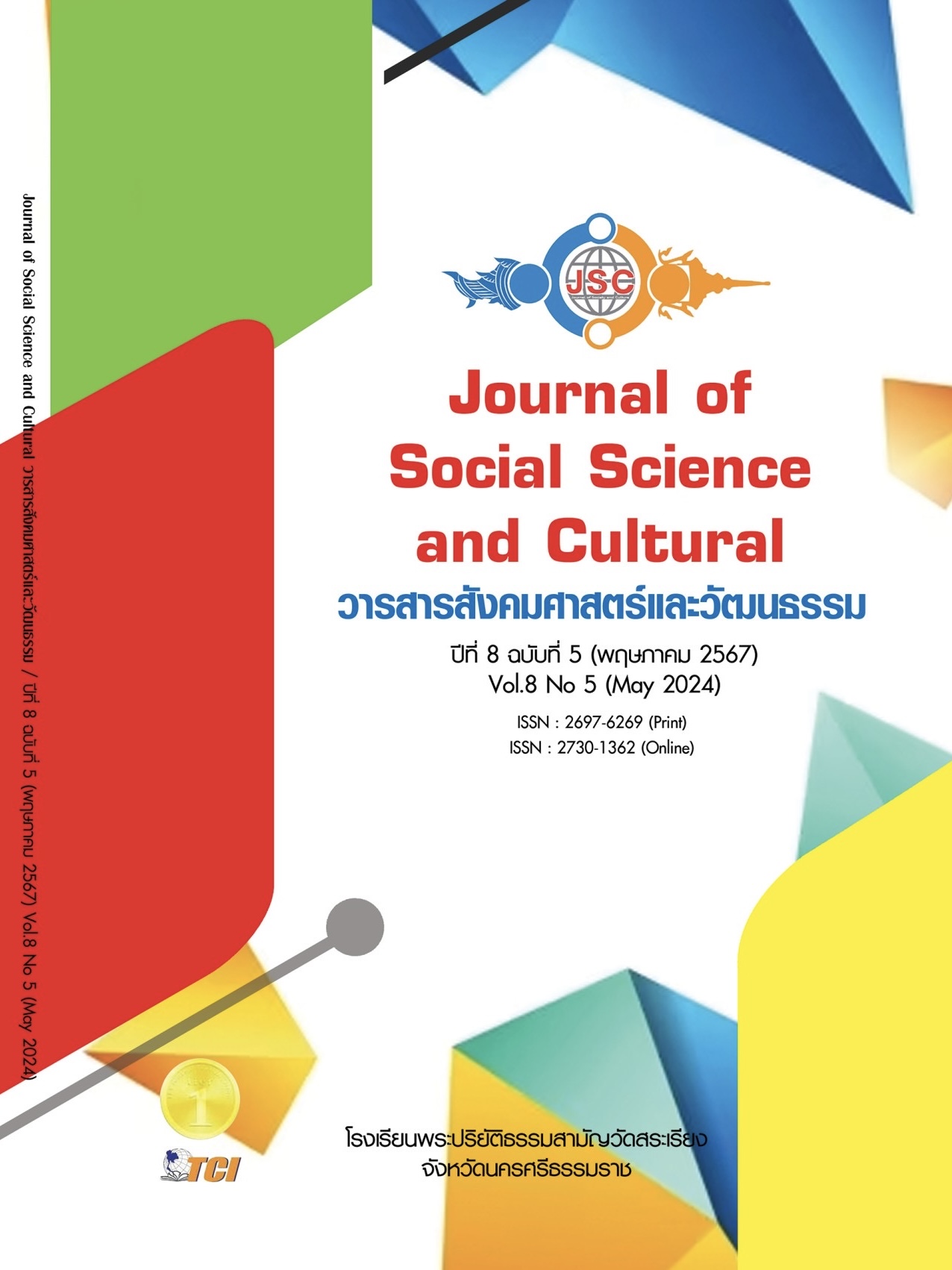EFFECTS OF PHYSICAL EDUCATION LEARNING MANAGEMENT VOLLEYBALL SUBJECT USING LEAD - UP GAMES TO SPORTS EFFECTS PLAY INTELLIGENCE - QUOTIENT OF SIXTH - GRADE PRIMARY SCHOOL STUDENTS
Main Article Content
Abstract
The purposes of this research 1) to compare the playing intelligence of Grade 6 students before and after the experiment of experimental group students and control group students. 2) to compare the playing intelligence of primary school students. 6 After the experiment between students in the experimental group and students in the control group The sample group is Grade 6 students in the 2nd semester of the 2023 academic year. The researcher randomly selected the sample classrooms using a simple random sampling method. By drawing lots to determine 2 sample research classrooms, divided into 25 students in the experimental group and 25 students in the control group. The duration of the research was 8 weeks. The tools used in the research included 1) a physical education learning plan. Volleyball subject using games leading to sports that affect playing intelligence, 8 plans, 60 minutes per plan, with an average of the total consistency index equal to 0.97. 2) The playing intelligence measure has a reliability value of the measure equal to 0.89 Data were analyzed using the average. standard deviation The difference in mean scores was tested with a "T" value. The results found that 1) the mean scores of playing intelligence of the experimental group students after receiving volleyball physical education learning using games leading to sports. It was significantly higher at the .05 level. The average of the playing intelligence scores of the control group students after receiving normal physical education learning. Not significantly different at the .05 level. 2) The mean scores of playing intelligence scores of the experimental group students after the experiment were significantly higher than those of the control group students at the .05 level.
Article Details
References
กระทรวงการท่องเที่ยวและกีฬา. (2561). นันทนาการอย่างสร้างสรรค์. กรุงเทพมหานคร: สำนักพิมพ์นันทนาการ กรมพลศึกษา กระทรวงการท่องเที่ยวและกีฬา.
กระทรวงศึกษาธิการ. (2551). สำนักงานคณะกรรมการการศึกษาขั้นพื้นฐานหลักสูตรแกนกลางการศึกษาขั้นพื้นฐาน พุทธศักราช 2551. กรุงเทพมหานคร: โรงพิมพ์ชุมนุมสหกรณ์การเกษตรแห่งประเทศไทย.
กันตภณ วิชัยทา. (2560). ผลการใช้เกมกลางแจ้งโดยใช้สมองเป็นฐานที่มีต่อสมรรถภาพทางกลไกของเด็กปฐมวัย โรงเรียนสาธิตมหาวิทยาลัยราชภัฏเชียงใหม่. ใน วิทยานิพนธ์มหาบัณฑิต สาขาวิชาศึกษาศาสตร์. มหาวิทยาลัยราชภัฏเชียงใหม่.
ชัชชัย โกมารทัต และคณะ. (2549). การพัฒนาเครื่องมือวัดความฉลาดในการเคลื่อนไหวร่างกายหรือความฉลาดในการเล่น. กรุงเทพมหานคร: สำนักวิชาวิทยาศาสตร์การกีฬา จุฬาลงกรณ์มหาวิทยาลัย.
ณัฐิกา เพ็งลี. (2562). ผลของโปรแกรมทักษะการเคลื่อนไหวพื้นฐานที่มีต่อทักษะกลไกการเคลื่อนไหวของเด็กปฐมวัย. วารสารครุศาสตร์ จุฬาลงกรณ์มหาวิทยาลัย, 47(3), 196-216.
พิชญา สวนช่วย. (2560). ผลการใช้โปรแกรมกิจกรรมเกมโดยประยุกต์ทฤษฎีการวางเงื่อนไขแบบการกระทำที่มีต่อสมาธิของนักเรียนประถมศึกษาตอนปลาย. ใน วิทยานิพนธ์มหาบัณฑิต สาขาวิชาสุขศึกษาและพลศึกษา. จุฬาลงกรณ์มหาวิทยาลัย.
พิชญาภา ยืนยาว. (2561). “ปัจจัยความฉลาดที่ส่งผลต่อคุณลักษณะที่พึงประสงค์ของนักศึกษาหลักสูตรครุศาสตรบัณฑิต มหาวิทยาลัยราชภัฏนครปฐม. Veridian E-Journal Silpakorn University, 11(1), 1961-1977.
พิมพ์รัตน์ ธรรมรักษา และอาภาพร เผ่าวัฒนา. (2561). ความฉลาดทางอารมณ์กับพฤติกรรมเสี่ยงในวัยรุ่น. วารสารวิจัยสุขภาพและการพยาบาล, 35(3), 212-223.
ไพศาล ศุภปฐม. (2557). ผลของการคัดเลือกผู้เล่นโดยใช้คะแนนความฉลาดทางการเล่นที่มีต่อการพัฒนาทักษะกีฬาบาสเกตบอลขั้นพื้นฐานในเด็กชายอายุ 12 ปี. ใน วิทยานิพนธ์มหาบัณฑิต สาขาวิทยาศาสตร์การกีฬา. จุฬาลงกรณ์มหาวิทยาลัย.
มณิฐา นิตยสุข และคณะ. (2566). ผลของการจัดการเรียนรู้วิชาพลศึกษาโดยใช้เกมนำไปสู่กีฬาที่มีต่อสมรรถภาพกลไกของนักเรียนประถมศึกษา. ใน วิทยานิพนธ์มหาบัณฑิต สาขาวิชาสุขศึกษาและพลศึกษา. จุฬาลงกรณ์มหาวิทยาลัย.
รัศมี ทองดี. (2562). ผลของการจัดการเรียนรู้พลศึกษาแบบร่วมมือที่มีต่อความมีน้ำใจนักกีฬาและทักษะวอลเลย์บอลของนักเรียนมัธยมศึกษาตอนปลาย. ใน วิทยานิพนธ์มหาบัณฑิต สาขาวิชาพลศึกษา. มหาวิทยาลัยศรีนครินทรวิโรฒ.
วรศักดิ์ เพียรชอบ. (2561). รวบรวมบทความเกี่ยวกับปรัชญา หลักการ วิธีสอน และการวัดเพื่อประเมินผลทางการพลศึกษา. กรุงเทพมหานคร: จุฬาลงกรณ์มหาวิทยาลัย.
ส่งศรี พุทธเกิด. (2561). ผลของการเล่นในสนามเด็กเล่น BBL ที่มีต่อสมรรถภาพทางกายและความฉลาดทางการเคลื่อนไหวในนักเรียนระดับประถมศึกษา. ใน วิทยานิพนธ์มหาบัณฑิต สาขาวิทยาศาสตร์การกีฬาและการออกกำลังกาย. มหาวิทยาลัยมหิดล.
สิทธิพงษ์ ปานนาค. (2563). การประยุกต์ใช้เกมในการจัดการเรียนรู้ทางพลศึกษา. วารสารบัณฑิตศึกษามหาวิทยาลัยราชภัฏวไลยอลงกรณ์ ในพระบรมราชูปถัมภ์, 14(1), 257-268.
สุดาพัทธ์ เลิศพรกุลรัตน์. (2558). ผลของการคัดเลือกผู้เล่นโดยใช้คะแนนความฉลาดทางการเล่นที่มีต่อการพัฒนาทักษะกีฬาแบดมินตัน ขั้นพื้นฐานในเด็กหญิงอายุ12 ปี. ใน วิทยานิพนธ์มหาบัณฑิต สาขาวิทยาศาสตร์การกีฬา. จุฬาลงกรณ์ มหาวิทยาลัย.
อรรถพล มณีแสง. (2557). ผลของการคัดเลือกผู้เล่นโดยใช้คะแนนความฉลาดในการเล่นที่มีต่อการพัฒนาทักษะกีฬาฟตุบอลในนักเรียนชายอายุ 12 ปี. ใน วิทยานิพนธ์มหาบัณฑิต สาขาวิทยาศาสตร์การกีฬา. จุฬาลงกรณ์ มหาวิทยาลัย.
Wibowo, R. et al. (2019). Fundamental Movement Skills and Game Performance in Invasion Game Activities. Faculty of Sport and Health Education. Indonesia: Universitas Pendidikan.
Wiwit, K. et al. (2020). Effects of Intelligence Quotient, Emotional Quotient, and Motor Educability on Players Ability to Tact in Soccer Games. Journal of Physical Education and Sports, 9(1), 44-49.


